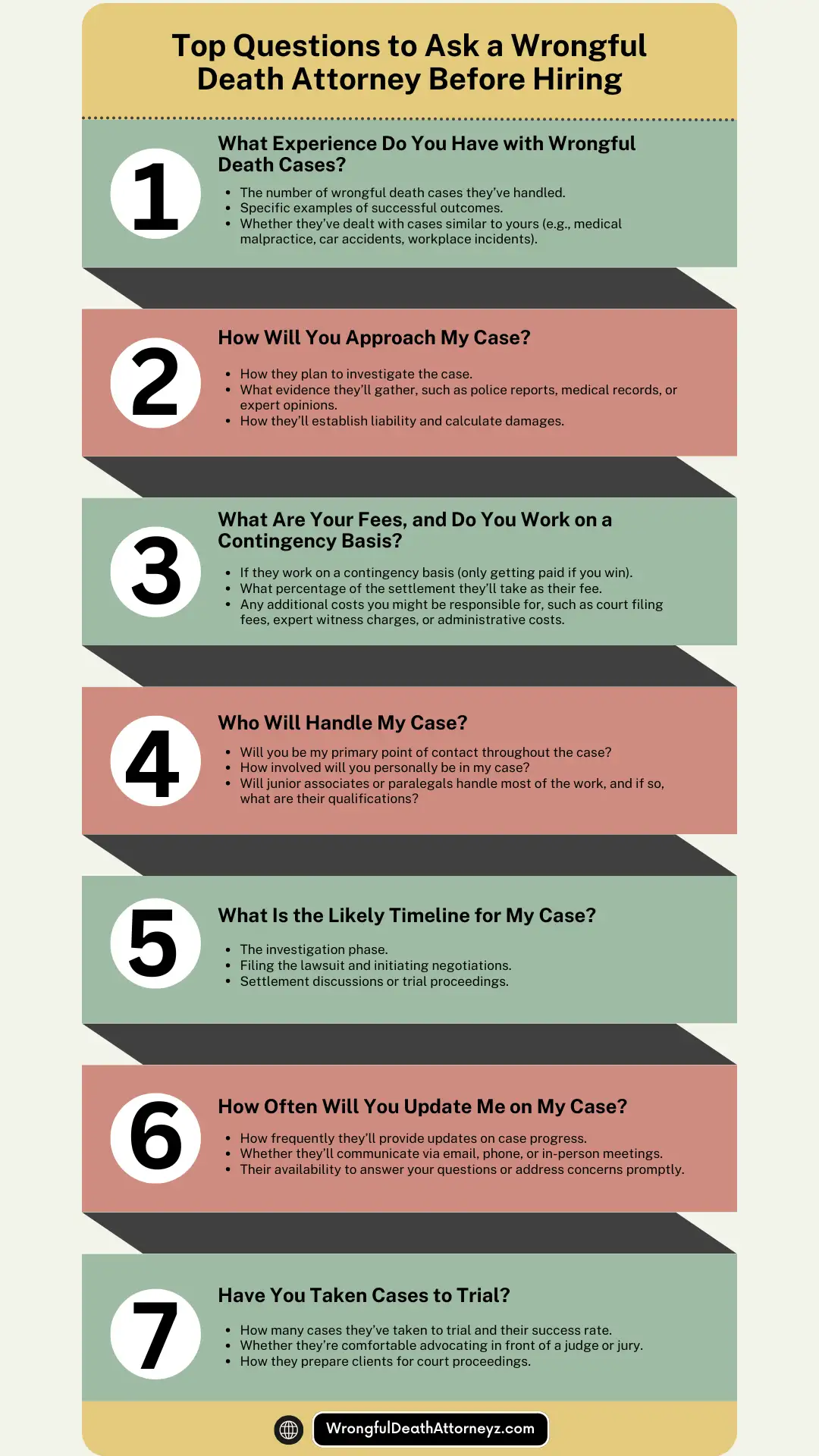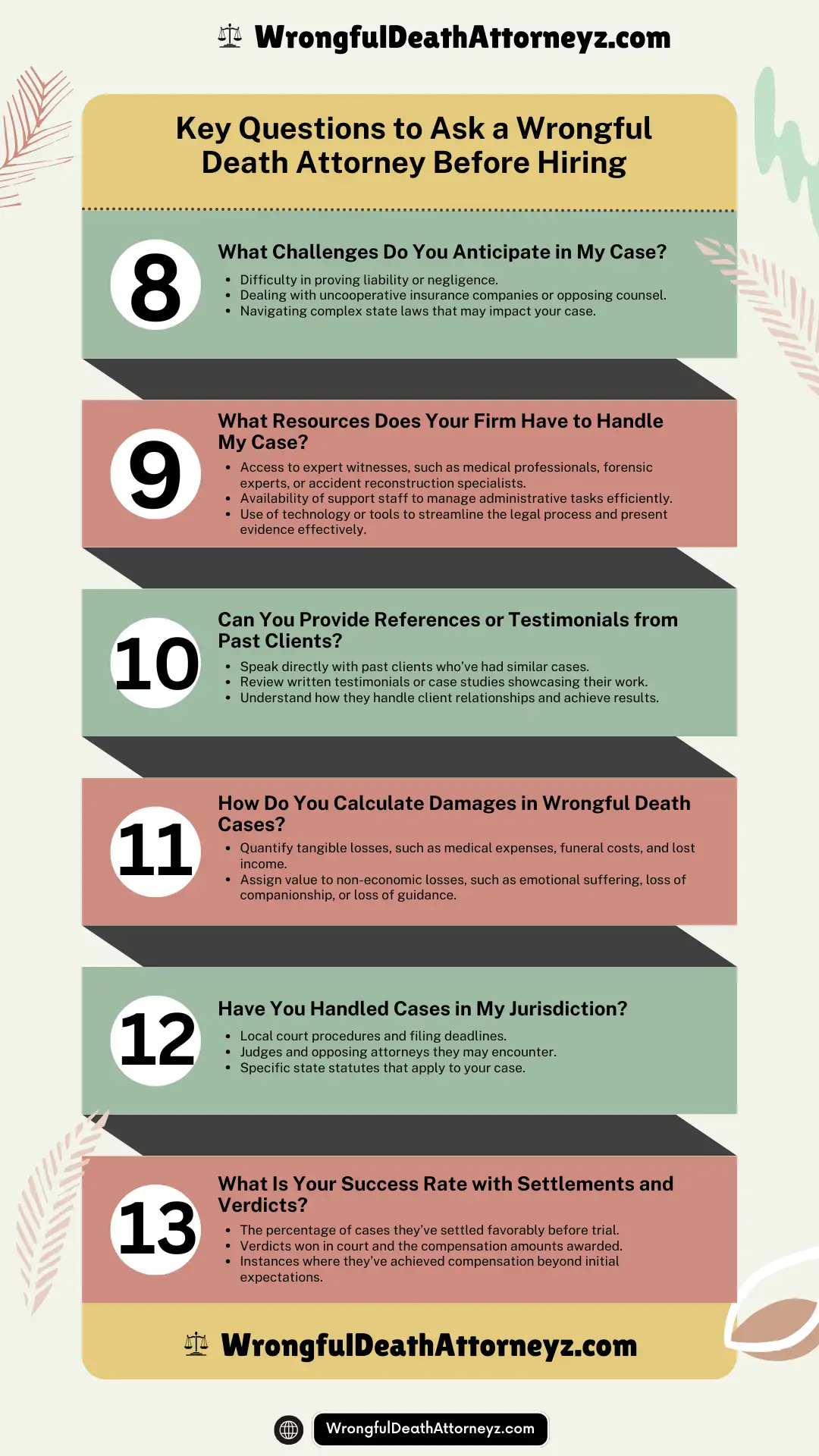Hello,If you’ve lost a loved one due to someone else’s negligence, we know the pain and uncertainty you’re going through. Choosing the right wrongful death attorney can feel overwhelming during such a difficult time. Asking the right questions can help you find an attorney who’s not only experienced but also compassionate and committed to your case.
In this article, we will share the top questions to ask a wrongful death attorney before hiring them to ensure you’re making an informed decision. Please read until the end for a comprehensive guide.
1. What Experience Do You Have with Wrongful Death Cases?
Not all attorneys specialize in wrongful death lawsuits, so it’s critical to ask about their experience. Inquire about:
- The number of wrongful death cases they’ve handled.
- Specific examples of successful outcomes.
- Whether they’ve dealt with cases similar to yours (e.g., medical malpractice, car accidents, workplace incidents).
Attorneys with extensive experience are more likely to understand the nuances of these cases, anticipate potential challenges, and handle them effectively.
Also Read –
12 Red Flags When Hiring a Wrongful Death Attorney
2. How Will You Approach My Case?
Understanding the attorney’s strategy is essential. Ask them to outline:
- How they plan to investigate the case.
- What evidence they’ll gather, such as police reports, medical records, or expert opinions.
- How they’ll establish liability and calculate damages.
A clear and detailed plan shows that they are prepared and confident in their ability to represent you.
3. What Are Your Fees, and Do You Work on a Contingency Basis?
Legal fees can be a significant concern, so clarify:
- If they work on a contingency basis (only getting paid if you win).
- What percentage of the settlement they’ll take as their fee.
- Any additional costs you might be responsible for, such as court filing fees, expert witness charges, or administrative costs.
Transparency about fees ensures there are no surprises later and helps you understand how much of your settlement you’ll retain.

4. Who Will Handle My Case?
In some firms, the attorney you meet may not be the one handling your case. Ask:
- Will you be my primary point of contact throughout the case?
- How involved will you personally be in my case?
- Will junior associates or paralegals handle most of the work, and if so, what are their qualifications?
Knowing who will manage your case helps you set realistic expectations and ensures you’re comfortable with the level of involvement of each team member.
5. What Is the Likely Timeline for My Case?
Wrongful death cases can take months or even years to resolve. Ask the attorney to provide an estimated timeline for:
- The investigation phase.
- Filing the lawsuit and initiating negotiations.
- Settlement discussions or trial proceedings.
While timelines can vary based on case complexity, a rough estimate will help you understand what to expect and prepare accordingly.
6. How Often Will You Update Me on My Case?
Communication is key during a legal process. Inquire about:
- How frequently they’ll provide updates on case progress.
- Whether they’ll communicate via email, phone, or in-person meetings.
- Their availability to answer your questions or address concerns promptly.
A responsive attorney ensures you’re never left in the dark about your case and can ease your stress during this challenging time.
7. Have You Taken Cases to Trial?
While many wrongful death cases settle out of court, some may require litigation. Ask:
- How many cases they’ve taken to trial and their success rate.
- Whether they’re comfortable advocating in front of a judge or jury.
- How they prepare clients for court proceedings.
An attorney with trial experience is better equipped to handle your case if settlement negotiations fail, ensuring they won’t pressure you to accept an inadequate offer.

8. What Challenges Do You Anticipate in My Case?
Every wrongful death case comes with its own set of challenges. A seasoned attorney should be able to identify potential obstacles, such as:
- Difficulty in proving liability or negligence.
- Dealing with uncooperative insurance companies or opposing counsel.
- Navigating complex state laws that may impact your case.
Their response will give you insight into their problem-solving skills and preparedness to tackle your case head-on.
9. What Resources Does Your Firm Have to Handle My Case?
Wrongful death cases often require substantial resources. Ask about:
- Access to expert witnesses, such as medical professionals, forensic experts, or accident reconstruction specialists.
- Availability of support staff to manage administrative tasks efficiently.
- Use of technology or tools to streamline the legal process and present evidence effectively.
A well-equipped firm is more likely to build a strong case on your behalf and increase your chances of a favorable outcome.
10. Can You Provide References or Testimonials from Past Clients?
Hearing from previous clients can give you valuable insights into the attorney’s professionalism, communication, and success rates. If possible, ask to:
- Speak directly with past clients who’ve had similar cases.
- Review written testimonials or case studies showcasing their work.
- Understand how they handle client relationships and achieve results.
Positive feedback from others can help you feel confident in your choice and reassure you of their capabilities.
11. How Do You Calculate Damages in Wrongful Death Cases?
Compensation in wrongful death cases can include economic and non-economic damages. Ask the attorney how they’ll:
- Quantify tangible losses, such as medical expenses, funeral costs, and lost income.
- Assign value to non-economic losses, such as emotional suffering, loss of companionship, or loss of guidance.
Their approach will give you a better understanding of how they’ll maximize your compensation and ensure no losses are overlooked.
12. Have You Handled Cases in My Jurisdiction?
Laws governing wrongful death cases vary by state and even city. Ensure the attorney has experience practicing in your area and is familiar with:
- Local court procedures and filing deadlines.
- Judges and opposing attorneys they may encounter.
- Specific state statutes that apply to your case.
Local expertise can make a significant difference in how smoothly your case progresses.
13. What Is Your Success Rate with Settlements and Verdicts?
Ask about their track record, including:
- The percentage of cases they’ve settled favorably before trial.
- Verdicts won in court and the compensation amounts awarded.
- Instances where they’ve achieved compensation beyond initial expectations.
A strong history of success indicates their ability to advocate effectively and secure justice for their clients.
Conclusion
Hiring the right wrongful death attorney is one of the most important decisions you’ll make during this challenging time. By asking these essential questions, you can gain clarity, confidence, and trust in your choice. Remember, the right attorney will not only possess the skills and experience needed to handle your case but will also treat you with empathy and respect.
If you’re ready to move forward, start by scheduling consultations with experienced wrongful death attorneys. Take the time to evaluate their answers and choose someone who feels like the best fit for your family’s needs. You deserve justice and the right attorney can help you achieve it.